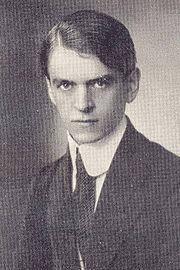
Kazys Binkis
Encyclopedia

Biography
Kazys Binkis was born on November 4, 1893 in the village of Gudeliai in the district of Biržai. He attended the primary school at PapilysPapilys
Papilys is a small town in Panevėžys County, in northeastern Lithuania. According to the 2001 census, the town has a population of 312 people....
(finished it in 1908), studied at the Saulė (The Sun) courses for teachers and at Biržai progymnasium. In 1910 he entered school of agriculture in Voronec (near Švenčionys
Švencionys
Švenčionys is a city located north of Vilnius in Lithuania. It is the capital of the Švenčionys district municipality. As of 2005, it had population of 5,658 of which about one-third is part of the Polish minority in Lithuania.- Name :...
), but for the lack of funds moved to Vilnius
Vilnius
Vilnius is the capital of Lithuania, and its largest city, with a population of 560,190 as of 2010. It is the seat of the Vilnius city municipality and of the Vilnius district municipality. It is also the capital of Vilnius County...
in 1913 and began to prepare himself privately for maturity examinations. Since 1909 K.Binkis began to publish scenes in prose and verses in Viltis (The Hope), Vaivorykštė (The Rainbow), and Pirmasis baras (The First Field). In 1915 he graduated from the teachers' courses of the Lithuanian Committee in Vilnius and became a teacher at Papilys. In 1918 Binkis was elected a chairman of the Biržai District Council. In 1919 he was appointed a secretary of editorial board of the journal Liepsna (The Flame) in Vilnius. In the same year he moved to Kaunas
Kaunas
Kaunas is the second-largest city in Lithuania and has historically been a leading centre of Lithuanian economic, academic, and cultural life. Kaunas was the biggest city and the center of a powiat in Trakai Voivodeship of the Grand Duchy of Lithuania since 1413. During Russian Empire occupation...
. There he worked at the press bureau, volunteered to the Geležinis Vilkas (The Iron Wolf) regiment and participated in concerts. In 1920-1923 he studied, with interruptions, literature and philosophy at Berlin University. At the same time he took part in the literary movement Keturi vėjai
Keturi vejai
Keturi vėjai was a Lithuanian literary movement and literary journal, active from 1924 to 1928.Keturi vėjai movement began with the publication of The Prophet of the Four Winds by Kazys Binkis...
(The Four Winds), being the leader of the budding Lithuanian futurism
Futurism (art)
Futurism was an artistic and social movement that originated in Italy in the early 20th century. It emphasized and glorified themes associated with contemporary concepts of the future, including speed, technology, youth and violence, and objects such as the car, the airplane and the industrial city...
(1922-1928).
He made his living from the literary work. In 1922, together with other authors, he published an almanac The Prophet of the Four Winds; in 1924 he organized a journal Keturi vėjai. He arranged the anthologies of Lithuanian folk poetry and songs. He also worked at the Society of Lithuanian Writers, for some years was a member of its board, participated in the edition of Literatūros naujienos (The News of Literature) and worked as a journalist.
Binkis died on April 27, 1942 in Kaunas', and is buried at Petrašiūnai Cemetery
Petrašiunai Cemetery
Petrašiūnai Cemetery is Lithuania's premiere last resting place formally designated for graves of people influential in national history, politics, arts, and science.- Location :...
.
Literary works
The heritage of Binkis's works is not large, but in all fields he achieved significant results. He wrote humorous and satirical poems, rhymed feuilletons, and published poetry books for children.In 1920 his first collection of poems Eilėraščiai (The Poems) was published. This collection of lyrical poems is one of the best works of Lithuanian poetry of this time. During the studies in Berlin Binkis was influenced by modernist poetry and he created modernist Keturi vėjai (Four Winds) literary movement. Keturi vėjai did not leave great literary works but broke the rutine, brought new literary forms, and this way made big impact on Lithuanian poetry. In 1923 (second edition in 1926) he published his second, futurist, collection of poems 100 pavasarių (One Hundred Springs). He created Keturi vėjai and he left it one of the first. From 1927 to 1931 Binkis published humorous poems in various periodicals, some of them were published as separate books. Tamošius Bekepuris ir kitos Alijošiaus dainuškos was published in 1928, Kriaučius Motiejus (Tailor Motiejus) was published in 1947.
He debuted as a play writer in 1938 with a piece Atžalynas (The Undergrowth). Encouraged by the success of his debut, he started writing a new play Generalinė repeticija (Dress Rehearsal) which he did not complete. Generalinė repeticija has bigger ambitions, different form, and composition. Generalinė repeticija was first time staged abroad, in Hanau
Hanau
Hanau is a town in the Main-Kinzig-Kreis, in Hesse, Germany. It is located 25 km east of Frankfurt am Main. Its station is a major railway junction.- Geography :...
camp in 1948, and first time published in 1958 in Pergalė journal. In Lithuania it was first time staged in 1959 (Ostrauskas:1997).
Righteous Among the Nations
During the Nazi occupation he hid JewsLithuanian Jews
Lithuanian Jews or Litvaks are Jews with roots in the Grand Duchy of Lithuania:...
in his home. At the Yad Vashem
Yad Vashem
Yad Vashem is Israel's official memorial to the Jewish victims of the Holocaust, established in 1953 through the Yad Vashem Law passed by the Knesset, Israel's parliament....
Holocaust memorial in Jerusalem there is a tree planted commemorating Sofia and Kazys Binkis as among the "Righteous Among the Nations
Righteous Among the Nations
Righteous among the Nations of the world's nations"), also translated as Righteous Gentiles is an honorific used by the State of Israel to describe non-Jews who risked their lives during the Holocaust to save Jews from extermination by the Nazis....
". (Number 660)

